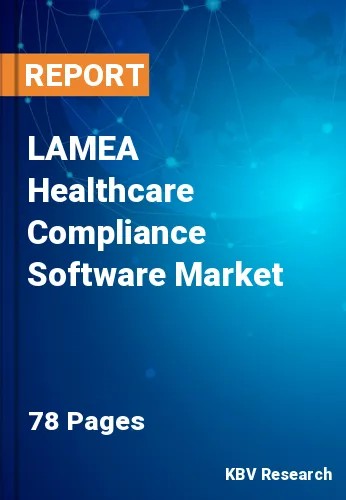The Latin America, Middle East and Africa Healthcare Compliance Software Market would witness market growth of 13.2% CAGR during the forecast period (2022-2028).
Automation technologies assist healthcare businesses in rapidly, effectively, and efficiently preparing for self-assessments by centralizing all of their compliance data for the healthcare industry. Healthcare providers can now evaluate compliance status and risk posture efficiently. Concrete steps to ensure healthcare compliance include automating evidence collection, monitoring controls around the clock, offering a security awareness program, and establishing a policy center.
While the OCR offers guidance on implementation, the Health & Human Services (HHS) notifies organizations of HIPAA updates and additions. To navigate HIPAA's legal language, rules, and exclusions, one must thoroughly understand the law and its weaknesses. Automated compliance software can greatly diminish the risks associated with the most recent HIPAA laws and regulations.
Organizations can stay current and secure in real-time with tools and software for healthcare compliance. Organizations can avoid penalties and fines by streamlining healthcare compliance workflows like risk assessments, testing, and control evaluations and lowering manual reliance and human error. More importantly, it frees the compliance staff to work on more complex projects like creating new policies to enhance patient care and shareholder return.
The United Arab Emirates has made great advances in the area of digital healthcare. With a high smartphone penetration rate and a tech-savvy populace, the nation is a market system for digital healthcare services. Digital healthcare solutions in the UAE include telemedicine, virtual consultations, electronic health records, and remote patient monitoring. These innovations can potentially revolutionize the UAE's healthcare sector by enhancing the quality of care, lowering healthcare expenditures, and expanding patient access to healthcare services. With this growing emphasis on digital healthcare, the region's healthcare compliance software market would grow.
The Brazil market dominated the LAMEA Healthcare Compliance Software Market by Country in 2021, and would continue to be a dominant market till 2028; thereby, achieving a market value of $75 Million by 2028. The Argentina market is exhibiting a CAGR of 13.8% during (2022 - 2028). Additionally, The UAE market would showcase a CAGR of 12.9% during (2022 - 2028).
Based on End-use, the market is segmented into Hospitals, Specialty Clinics and Others. Based on Product Type, the market is segmented into Cloud and On-premise. Based on Category, the market is segmented into Policy & Procedure Management, Medical Billing & Coding, License, Certificate, & Contract Tracking, Training Management & Tracking, Auditing Tools, Incident Management and Accreditation Management. Based on countries, the market is segmented into Brazil, Argentina, UAE, Saudi Arabia, South Africa, Nigeria, and Rest of LAMEA.
Free Valuable Insights: The Worldwide Healthcare Compliance Software Market is Projected to reach USD 5 Billion by 2028, at a CAGR of 10.5%
The market research report covers the analysis of key stake holders of the market. Key companies profiled in the report include RLDatix, HealthStream, Inc., Atlantic.Net, Inc., Healthicity, LLC (SixSails), ConvergePoint, Inc., Beacon Healthcare Systems, Inc., Complinity Technologies Pvt. Ltd., Sprinto Technology Private Limited, Panacea Healthcare Solutions, Inc. (Besler & Co., Inc.), and Smartgate Solutions Ltd. (Radar Healthcare)
By End-use
By Product Type
By Category
By Country
Our team of dedicated experts can provide you with attractive expansion opportunities for your business.

